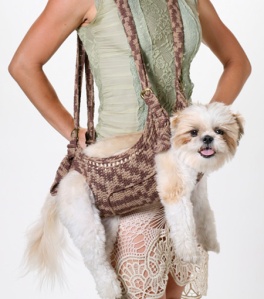Furbabies
One of the current trends in dog-owning culture is that of thinking of dogs as “children” or “babies”, exemplified by terms like “furbaby” and “Pet parent”. Frequently, anthropomorphism is vilified, particularly in behaviorist circles as being unfair to a dog, as being flawed as a method of understanding behavior. Often the same people who vilify anthropomorphism in a behaviorist context engage in that same flavor of anthropomorphism that leads them to swearing off using any force with a dog, refusing to use crates, and always attempting to avoid all stress for their dogs, an infantalizing of their dogs.
After all – people in this mindset do not treat their dogs like their children, of course not. You’d never let your child deface your property without consequence, even very young children. You’d never take all responsibility and accomplishment away from your child in the name of protecting them. You would certainly never spend all of your time petting and praising your child for doing absolutely nothing. You would be clear to a child, decisive, teaching them the rules of life and how to navigate social environments. If a child was violent, you’d never just accept it and try to isolate the child away from any stressful, triggering situations – at least I should hope the parent would attempt to find help for the kid.
Dogs aren’t treated like children. Dogs are treated like babies.
A mature dog has about the mental capacity of a two or three year old kid – and two and three year old kid is generally going through the process of being potty trained, going to preschool, learning how to speak effectively and to use polite communication to navigate the world. Children at this age are allowed to help with household tasks (though how effective they are is questionable) and take responsibility for certain areas of their life and behavior. Additionally, about certain things the three-year-old-kid comparison isn’t even sufficient, because adult dogs are very mature in their physical capacity and in certain ways that they interact with the world, and particularly in their emotional maturity they are “older”.
Just as it’s disastrous to infantalize young children, It’s equally disastrous to infantalize a dog.
Dogs, like toddlers, want to know very clearly what rules are, to be provided with predictable structure, and also given plenty of responsibilities (within their capability, which if you remember that dogs are very physically capable can be quite challenging things). It’s fulfilling to have responsibilities, tasks, and rules, and means that a dog gets a lot more freedom and quality of life when you provide these things, much how a well behaved toddler can go to a lot more places with its parents than a screaming hooligan.
Restricting a dog by treating it like an infant means never providing it with rules and expectations, never teaching it how the world works, never having any goals for that dog. By coddling and protecting and isolating a dog from stress, strange things, or learning experiences that are sometimes unpleasant, you’re doing the dog no favor. When this happens, the dog’s world shrinks and keeps shrinking as they become more confused, more anxious, sometimes more aggressive.
As infants grow into children, good parents expect more of them, and take the time to teach and guide their children. Dog owners often never do.
Knowing as I do what dogs are capable of if you do take the time to give them that structure, training, and expectations, it’s insulting to see people who treat their dogs like mental deficients, like helpless babies. It’s a squandering of that potential, a disrespectful and sometimes intentional ignorance of what a dog can become and what is best for them, all in the name of selfish, codependent emotional gratification on the part of the owner.
Dog owners don’t have “furbabies”, they have dogs. We have a responsibility to dogs to give them the guidance they need to become the fulfilled, sufficient, thinking beings they deserve to be.


Agree that sometimes coddling a dog can just make a behavior worse…however, having a dog with certain noise sensitivities, I’m learning that ignoring the sounds or tough love isn’t always the right fix either….sometimes, you have to know the dog and work through the issues with them. I’ve had much more success acknowledging the sounds and then telling her that we’re going to work through it anyhow, versus other methods. But I’ve had epic fails with different tactics that took months for her to get over…. But the goal is Getting Through the issues so that you and your dog can concur this world and enjoy all it has to offer. I like to comfort for a moment, then tell her to suck it up…because that’s what seems to work best for her. She needs the extra confidence and that I understand she’s frightened… Once she knows I’m not afraid, she then gets the courage to try it…but man, it can try your patience…and the silly things that she can find scary will make you laugh. Makes you wonder what they are really thinking in their heads….oh yes, that Duct Tape is really going attack you…silly dog. People laugh at us often…but that’s ok, because I know we’re making amazing progress and she’s brilliant…she just thinks she’s a pretty Princess!
Oh, i’m not advocating not ever being nice to your dog by any means – I’m just advocating respecting your dog as an individual, challenging them, knowing that they’re capable of a lot and not always trying to save them from every discomfort. Like you said, you may sympathize with her sound sensitivity, but you don’t completely restructure her life around avoiding sounds. 🙂